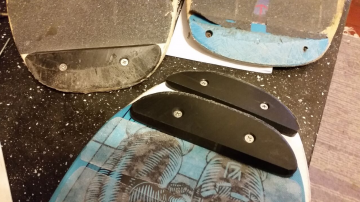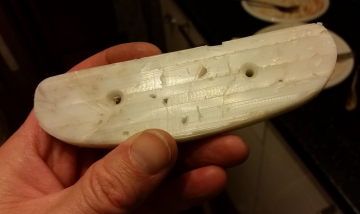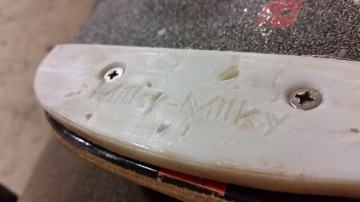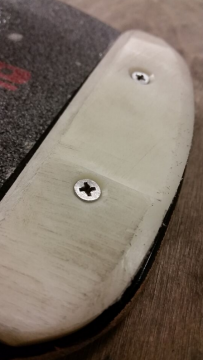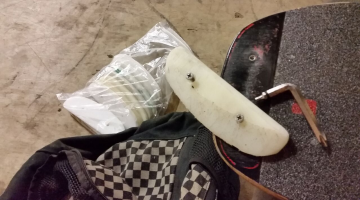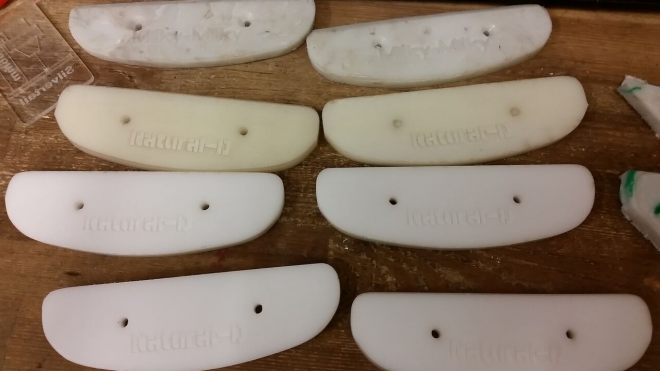Freestyle Skateboard Skidplates: Difference between revisions
mNo edit summary |
m Danspencer101 moved page Project:Freestyle Skateboard Skidplates to Freestyle Skateboard Skidplates over redirect |
||
| (2 intermediate revisions by 2 users not shown) | |||
| Line 98: | Line 98: | ||
* http://www.par-group.co.uk/engineering-plastics/plastic-sheet/polyethylene-pe1000-sheet-uhmw-availability/polyethylene-pe1000-sheet-uhmw/ | * http://www.par-group.co.uk/engineering-plastics/plastic-sheet/polyethylene-pe1000-sheet-uhmw-availability/polyethylene-pe1000-sheet-uhmw/ | ||
Here's a video of the UHMWPE manufacturing process: - | Here's a video of the final UHMWPE skidplate manufacturing process: - | ||
https://youtu.be/aCGPJNryHZ4 | https://youtu.be/aCGPJNryHZ4 | ||
{{#widget:YouTube|id=aCGPJNryHZ4}} | |||
Latest revision as of 11:52, 5 February 2019
| Freestyle Skateboard Skidplates | |
|---|---|
| Primary Contact | Michael Erskine |
Freestyle skateboards typically have skidplates (a.k.a. "tail-savers" or "tail-skids") to reduce the frictional wear on the underside of the deck nose and tail. Avoiding wear on the nose and tail is important for freestyle boards as there are many tricks that excert a lot of force on the ends of the board which, if worn down too far, will delaminate and ruin the deck. Freestyle skidplates are typically plastic or wood and are bolted or screwed to the deck. Plastic is preferred as it offers less friction. There are very few commercial outlets for freestyle skidplates, mostly from specialist skate shops in the USA and Germany.
-
Various Freestyle Skateboard Tailskids
Goals
- suitable for use (durable)
- cheap
- easy to make
- consistent quality
- sustainable
We (i.e. the UK Freestyle Skateboarding community) are looking for an alternative, convenient source of consumable skidplates. Resistance to wear needs to be balanced with cost and convenience. Cost is of course a product of both materials price and manufacturing labour time. In this regard, the two initial prototypes currently produced are probably the most expensive skidplates every made! As we are all aware, one-off prototypes are rarely representative of a commercially viable product!
A further goal, which is important to me in the International Freestyle Skateboarding Community, is to not unduly affect the revenue streams of other grass-roots freestyle skate companies. It is for this reason that I promise to only ever produce these on a not-for-profit basis, perhaps as sponsorship only.
Balance: -
- buying in high quality engineering plastics that can be quickly manufactured into skidplates
- recycling readily-available HDPE into stock that can be "reasonably" quickly manufactured into skidplates
Prototypes
Materials: -
| Material | Info | Laser-safe | Machinable | Price | Testing |
|---|---|---|---|---|---|
| HDPE | plastipedia wp | Yes but "melty" | Yes but slightly "chewy" | Low | Underway |
| Polypropylene | wp | Yes but "melty" | Yes (needs testing) | Unknown | None |
| Acetal (Delrin) | plastipedia wp | Yes (excellent) | Yes (excellent) | Fairly High | Underway |
| LDPE | wp | Unknown | Unknown | Unknown | None |
| PTFE (Teflon) | wp | Unknown | Yes (excellent) | Crazy Expensive | None |
| Nylon 66 | plastipedia wp | Unknown | Yes (excellent) | Unknown | None |
"Milky-Milky" Recycled HDPE prototype 1
- Recycled from plastic milk bottles - See HDPE Processing
- Rendered in toaster oven at 230 degrees C
- Machined plate on Bridgeport to 8mm
- outline and fixing drill holes etched on laser cutter
- outline cut on bandsaw
- fixing holes drilled on pillar drill
- bevel (yet to be formed)
-
Almost Finished Prototype 1
-
Fitted for testing, etched with logo
"Natural-D" Delrin prototype 1
- engineering 8mm Delrin plate offcut
- laser cut outline and drill holes at 7mm/sec
- re-drill and countersink of bolt holes on pillar drill
- bevelled edge made on disk sander
- testing in progress - going well!
-
Testing in progress
-
After a couple of weeks of testing
-
HDPE and Delrin prototypes etched with logos
I have now distributed all the prototypes for testing amongst the UK freestyle community --Michael Erskine (talk) 12:14, 18 November 2015 (UTC)
UHMWPE
Ultra-high-molecular-weight polyethylene is the material of choice for the mainstream commercial skidplate manufacturers - I worked this out by elimination and skate industry hearsay!
Initial prototypes show the following: -
- cost is similar to that of delrin
- more hard-wearing than delrin
- less slippery than delrin
- harder to work with than delrin
- cannot be laser cut but outlines can be etched on the laser to be followed on the band-saw
- also known as PE1000 - the grades may differ!
Various skaters have tried them and the results are favourable. The first batch was 20x Moonshine shape from a sheet of Black UHMWPE Sheet (Thickness: 8.0mm, Size: 235mm x 470mm) costing £16.00 inc. VAT but a whopping £8.50 postage (from Trent Plastics). I think I'd like to try another supplier to see if the material grade is consistent. The grade of "Regen" is equivalent to PE1000 for non-food applications and a bit cheaper (from Direct Plastics - available in green - may try this one next)
Suppliers: -
- http://www.directplastics.co.uk/rg1000-sheet
- http://www.bayplastics.co.uk/polyethylene.htm
- http://www.par-group.co.uk/engineering-plastics/plastic-sheet/polyethylene-pe1000-sheet-uhmw-availability/polyethylene-pe1000-sheet-uhmw/
Here's a video of the final UHMWPE skidplate manufacturing process: -
Industrial Processes
- Materials sourcing (per material type)
- HDPE "Milky-Milky" type - See HDPE Processing
- Collecting/washing/processing HDPE milk bottles
- Melting and laminating into "slugs", pressing into molds
- milling slugs into stock 8mm plates
- Delrin "Natural-D" type
- Engineering plastics suppliers (eBay, etc.)
- HDPE "Milky-Milky" type - See HDPE Processing
- Cutting (per material type)
- Delrin - Blackfin A0 laser cutter 5mm/s at 60% power (58% corner power)
- HDPE - etched outline on surface with laser cutter then bandsaw and disc-sander
- Finishing
- 45 degree bevel on back edge, 4mm depth, various methods
- mounting holes - drill press (not necessary for Delrin)
- countersink holes - hand drill by eye 50% depth
- mounting hardware
Current Skidplate Sources
eBay search terms: -
- Skateboarding category
- NOS Powell Tailbone
- skid plate in Skateboarding
- tailsaver, tail-saver, tail saver, tailbone, tail-bone, tail bone, tailskid, tail-skid, tail skid, skidplate, skid-plate skid plate
International skate shops
